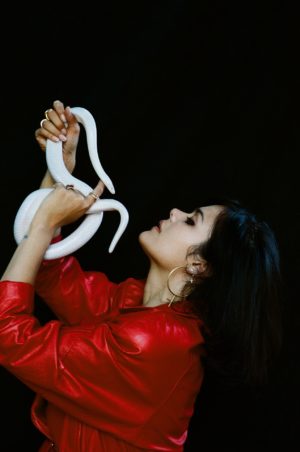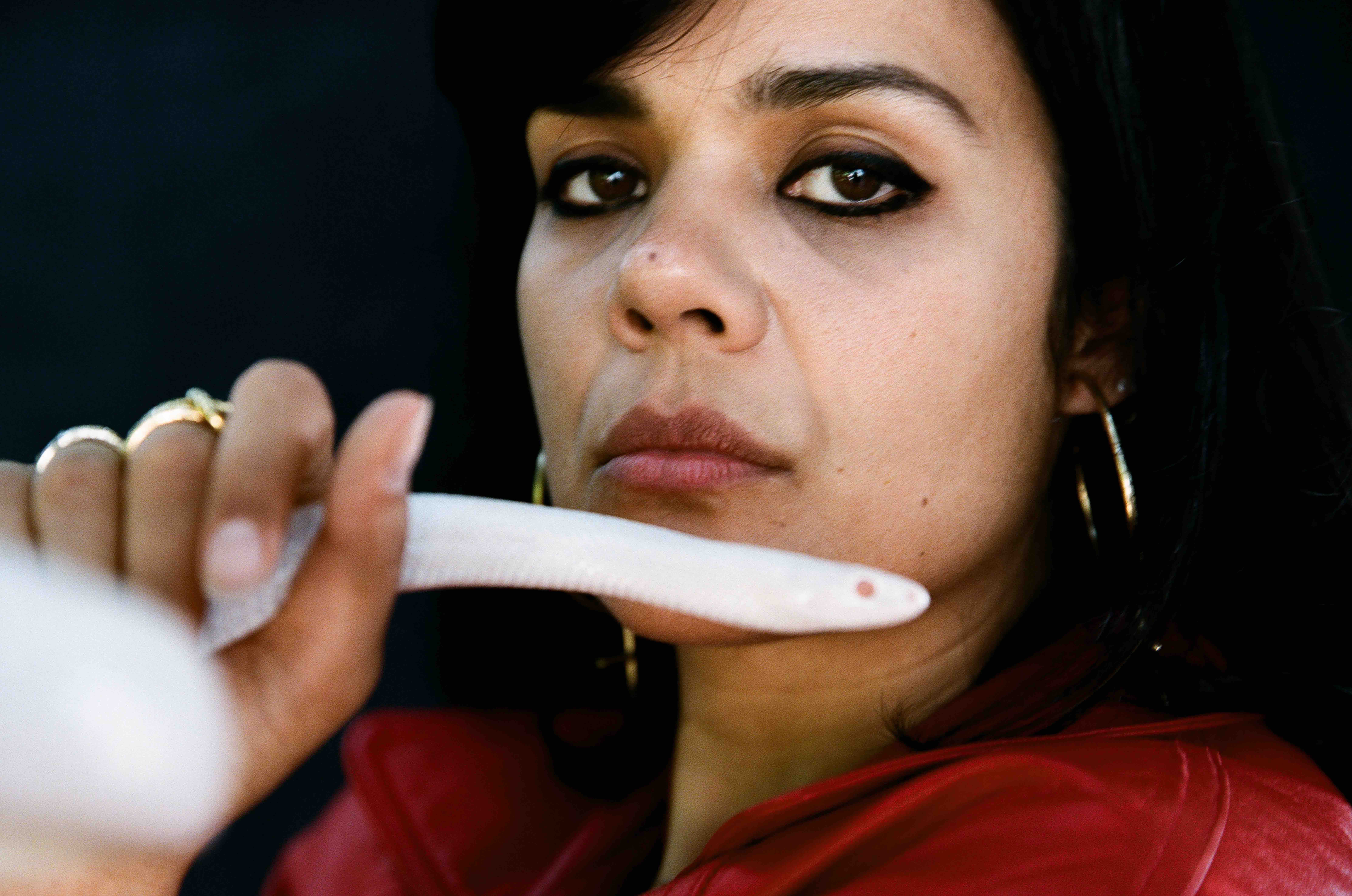Natasha Khan’s dog, Janice, is alternating between cuddling with her on the couch and jumping up and growling menacingly at sounds she thinks she hears. Khan, who goes under the moniker Bat for Lashes, is at home in Los Angeles’ Highland Park, where she’s lived for the last two and a half years. The English expatriate rescued Janice from Mexico, where Khan was doing post-production on a short film.
“The guy I stayed with had found Janice half-dead and brought her back to life,” recounts Khan. “She wouldn’t leave my side the whole time and we fell in love. He got her a rabies shot and a Mexican passport and brought her to me on the plane. I think it’s easier to be a dog getting over here than it is a human.”
Khan doesn’t mean to be facetious; the ease of immigration to the United States for a non-human is an observation of fact. It’s something she took into consideration when she was planning on moving to California. She was dealing with Brexit on one end and Trump on the other. The lure of the Golden State’s combination of magical desert and trees as old as time, however, overrode everything else.
Khan read a lot of Native American stories and mythology as a young girl, and their images and themes stuck with her. “The energy of the land here feels quite ancient,” she says. “To go to Death Valley or the redwoods, for me, is the equivalent of historic European architecture. I love storytelling. I love myths. I love archetypes. I love religion—not that I practice it, but narrative is such a healing, important tradition that we shouldn’t forget. It comes across in film and art. Cinematic folklore combined with mystical, archetypal, ancient feminine folklore—those are the things I pursued, and got a lot out of, when I came here.”
 This is the palette Khan used to create the tone, setting, and characters for her fifth album, Lost Girls. As in so much of her work, Khan assumes a persona on the record: She is Nikki Pink, the lone gal whose would-be girl gang comes from “the other side,” a forbidden desert land, perhaps; they storm the city and claim Pink as one of their own. This sounds part classic Los Angeles tale of shimmery sunsets and smoke-tinged air and part Laurel Canyon turn on, tune in, drop out hallucinogenic experience.
This is the palette Khan used to create the tone, setting, and characters for her fifth album, Lost Girls. As in so much of her work, Khan assumes a persona on the record: She is Nikki Pink, the lone gal whose would-be girl gang comes from “the other side,” a forbidden desert land, perhaps; they storm the city and claim Pink as one of their own. This sounds part classic Los Angeles tale of shimmery sunsets and smoke-tinged air and part Laurel Canyon turn on, tune in, drop out hallucinogenic experience.
She traverses from the percolating “Desert Man” to “Jasmine,” that nighttime scent of Los Angeles, and a song that could have fit into the definitive and defunct British chart show Top of the Pops in 1983. In that same vein, “Vampires” combines both The Cure’s “Fascination Street” and Hall & Oates’ “Maneater” in a glorious fusion. The nature references continue on the spine-chilling “Peach Sky” and simmering “Mountains.”
“I have said in the past that having a character is an interesting creative tool to use,” says Khan of Nikki Pink. “Thinking about it more and more, it’s actually the director in me, or the sculptor of a story in me. I wanted a more heightened, panoramic, full-color version of my experience in LA. I used the Nikki character to push this narrative and this story. I could play and have fun, have vampire teeth and dress up in a red leather jacket, act and improvise with actors.
“I don’t think the emotional content on Lost Girls would be any less personal, intimate, or honest if it was coming just from me,” she continues. “The Nikki aspect makes the album a little more fantastical. Having a character that is part-vampire just gives more juice when you’re writing words and thinking about what instruments to choose. It gives you a focus or a prism that you can shine things through to create a more diverse universe.”
“The energy of the land here feels quite ancient. To go to Death Valley or the redwoods, for me, is the equivalent of historic European architecture.”
Charles Scott IV helped bring punch and additional textures to Khan’s already penned songs on Lost Girls. His day job is at J.J. Abrams’ Bad Robot Productions as the in-house music supervisor, producer, and songwriter. But rather than tap into Scott’s cinematic expertise, Khan bonded with him over their musical geekiness and his ability to name any synth from any John Carpenter film, or any pedal from any Depeche Mode album. She also tapped into his love of pop music and funky bass playing.
“We both love ’80s pop music; Motown and soul is what we grew up on, and we’re also huge film lovers,” Khan explains. “He’s such a music lover and he got to liberate all that knowledge through doing Lost Girls. I’ve used ’80s sounds across all my albums; this time, it was interesting to get out all those old synths and find sounds that reminded me of sounds I’ve heard all my life. But then, I used modern-day production techniques, like drum machines with deep sub-bass to ramp things up, to create alchemy between decades and instruments.”
This point in time in Khan’s life is one that is both coming full-circle and full of new beginnings. She’s a free agent as far as record deals go. She has reconnected with her father, who is of Pakistani origin and also a California resident, and reclaimed his history and religious stories. She’s entertaining the possibility of visiting Pakistan with him again, and steeping herself in the country’s atmosphere.
She’s also verging on the fourth decade of her life, talking about having a baby and producing a film—one of the main reasons she came to Los Angeles. Khan enrolled in UCLA Extension’s Relationship Driven Screenwriting course to rework her script, and in the meantime, she’s testing out short snippets of her ideas in videos she posts on Instagram. She’s been looking eagerly at what’s coming down the line, having woven herself into the fabric of a new community in her adopted city.
The first thing Khan did upon arriving in Los Angeles was join the Women’s March. Next, she taught meditation to rehabilitating prisoners, and also a ten-week course at a continuation school for primarily black and Hispanic young people trying to finish high school.
“If I’m going to move somewhere, I want to contribute,” she says matter-of-factly. “Giving back is important to me. But I get so much from doing that. I get structure. I get a location. I get interaction. I learn about where I fit within this culture and community. Plus, there is the huge heart expansion from seeing kids creating artwork and doing stream of consciousness writing and thinking about poetry. They have such a fight-or-flight manic lifestyle—there has been no time for them to reflect or think creatively. I know how much being able to do that saved me as a kid who was traumatized.
“But also,” she continues, “I was lonely in LA and I didn’t really know what I was doing. When you feel like that, the best thing to do is be a part of the community or an institution or a school. Institutions hold a lot of safety and roots for me. Academic places or libraries, I seek those sorts of places out. They make you feel like there’s some history and a wealth of knowledge there.”
“There is the huge heart expansion from seeing kids creating artwork. They have such a fight-or-flight manic lifestyle—there has been no time for them to reflect or think creatively. I know how much being able to do that saved me as a kid who was traumatized.”
Lost Girls isn’t only about the LA fantasyland of Khan’s imagination. It’s also her recapturing the exuberant feelings of a childhood in the ’80s. Her birthdays were the pinnacles, just ahead of Halloween, with inevitable costume parties.
“There was a lot of love for American culture in England at the time,” she remembers. “There was Michael Jackson, Madonna, and Prince, E.T. and The Karate Kid, so full of optimism. It was a decade where there was a lot of fucked up stuff happening, but the response to it was to be as crazy and colorful as possible. I wanted Lost Girls to have that feeling of childhood for me, but I didn’t want it to be a pastiche. I wanted it to be very Bat for Lashes and new, but still giving us these feelings.
“Music is where I go when I want to make something to elevate me,” she concludes. “The feeling of freedom and liberation I get from the songs mirrors back that I’ve matured—and maybe I’m just a bit happier than I was and maybe a bit more settled. At some points there’s a synthesis of life circumstances, emotional maturity, creative maturity, and a new cycle beginning.” FL







